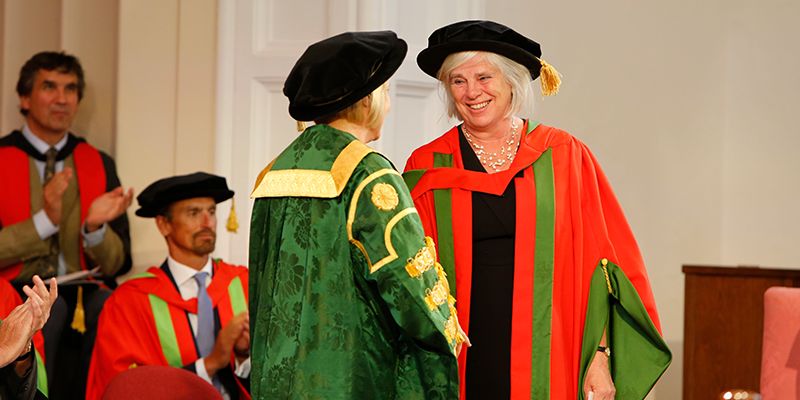Christine Mary Rutherford Fowler

Presentation address by Professor Simon Bottrell
Chancellor,
In an age of globalisation, and unprecedented mass travel, one could be forgiven for thinking that the era of great exploration and discovery lies behind us, and that there is little left for us to map.
The reality, of course, is very different. We have barely begun to explore our oceans, and there is even greater potential for remote exploration within and underneath the surfaces of the Earth. This is exploration that will enrich our understanding of our planet’s structure, and allow us to map the huge span of its history and likely development. And this is the exploration being undertaken by Professor Mary Fowler.
Mary is a leading light in geophysics, the study of the earth by quantitative physical methods. With a background in mathematics and earth sciences, her work has an exceptionally strong methodological foundation. She has achieved a remarkable clarity of insight into both the Earth's surface and its deep interior. Her research has illuminated the biogeography of deep sea hydrothermal vent faunas; the formation of sedimentary basins; magma chamber processes; and oceanic crustal structure – including the first use of synthetic seismogram techniques. Her book, The Solid Earth: An Introduction to Global Geophysics, is acknowledged around the world as a core text for undergraduates. It provides clear and scholarly analysis, and a pathway to more advanced methods for addressing – and for framing – the next questions that might arise.
From a distinguished academic family (her great-grandfather was Ernest Rutherford), Mary is also an inspiring academic leader. In 1992 she returned to the UK from the University of Saskatchewan to head the Department of Earth Sciences at Royal Holloway, where she also became Dean of the Science Faculty. Her publication record is formidable, but she has also undertaken many editorial and advisory roles. And she has served with great distinction on some of our foremost academic bodies, becoming, for example, Vice-President of the Royal Astronomical Society. In 2012 she was elected Master of Darwin College, in which role she has taken Cambridge’s largest graduate-only college from strength to strength.
Frank Borman, NASA astronaut and Commander of Apollo 8, once said that ‘exploration is really the essence of the human spirit’. Mary’s work embodies that spirit and the curiosity that goes with it.
Chancellor, it is my great pleasure to present to you for the Degree of Doctor of Science, honoris causa, Christine Mary Rutherford Fowler.